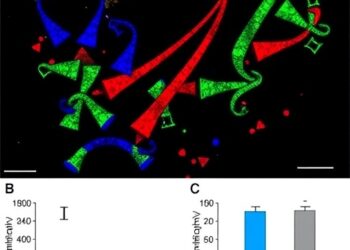Reston, VA—Extended prostate-specific membrane antigen (PSMA)-targeted radiopharmaceutical therapy (177Lu-PSMA) beyond six cycles is an effective and well-tolerated treatment for metastatic castration-resistant prostate cancer patients, according to new research published in The Journal of Nuclear Medicine. Selected patients who received extended treatment—either continuously or following a treatment break—experienced a favorable median survival of 31.3 months from the first administration.
“Patient response to PSMA-targeted radiopharmaceutical therapy is highly variable in depth and duration of response,” said Wolfgang P. Fendler, MD, vice chair of the Department of Nuclear Medicine at the University Hospital Essen, in Essen, Germany. “It may be beneficial to extend the use of 177Lu-PSMA, however, systematic data on safety and the antitumor effect of 177Lu-PSMA radiopharmaceutical therapy beyond six cycles is scarce.”
The multicenter retrospective analysis included 111 metastatic castration-resistant prostate cancer patients who received more than six cycles of 177Lu-PSMA. Forty-three patients (38.7 percent) received continuous 177Lu-PSMA treatment and 68 (71.3 percent) received rechallenge treatment after a therapy break of at least four months. Researchers assessed overall survival, prostate-specific antigen (PSA) decline, PSMA PET response, and adverse events to determine the safety and efficacy of extended 177Lu-PSMA therapy.
Overall survival from the initiation of 177Lu-PSMA therapy was 23.2 months for the continuous treatment group and 40.2 months for the rechallenge group; the median overall survival for both groups was 31.3 months. The PSA decline of more than 50 percent and the initial partial response rate on PSMA PET was significantly higher in the rechallenge group than in the continuous treatment group. Rates of grade three to four toxicity were comparable between both groups.
“This study represents the inaugural multicenter investigation of extended 177Lu-PSMA therapy, encompassing up to 13 cycles of treatment, continuously or following a treatment break. Dose reduction and discontinuation rates due to adverse events were low and patients achieved durable responses after treatment pause,” said Tugce Telli, MD, researcher at University Hospital Essen. “Given the limited treatment options for metastatic castration-resistant prostate cancer, the extension or retreatment of 177Lu-PSMA therapy beyond six cycles may be a valuable option for patients who initially have a good or excellent response to treatment.”
This study was published online in May 2024.
The authors of “Safety and Efficacy of Extended Therapy with [177Lu]Lu-PSMA: A German Multicenter Study” include Robert Seifert, Department of Nuclear Medicine, University Hospital Essen, Essen, Germany, German Cancer Consortium, University Hospital Essen, Essen, Germany, West German Cancer, University Hospital Essen, Essen, Germany, Department of Nuclear Medicine, University Hospital Bern, Bern, Switzerland, and Department of Nuclear Medicine, University Hospital Münster, Münster, Germany; Tugce Telli, Mélanie Desaulniers, Ken Herrmann, and Wolfgang P. Fendler, Department of Nuclear Medicine, University Hospital Essen, Essen, Germany, German Cancer Consortium, University Hospital Essen, Essen, Germany, and West German Cancer, University Hospital Essen, Essen, Germany; Constantin Lapa and Christian Pfob, German Cancer Consortium, University Hospital Essen, Essen, Germany, and Department of Nuclear Medicine, Faculty of Medicine, University of Augsburg, Augsburg, Germany; Turkay Hekimsoy, Wolfgang A. Weber, and Matthias Eiber, German Cancer Consortium, University Hospital Essen, Essen, Germany, Department of Nuclear Medicine, Klinikum Rechts der Isar, Technical University Munich, Munich, Germany, and Bavarian Cancer Research Center, Erlangen, Germany; Boris Hadaschik, German Cancer Consortium, University Hospital Essen, Essen, Germany, West German Cancer, University Hospital Essen, Essen, Germany, and Department of Urology, University Hospital Essen, Essen, Germany; Martin Bögemann, West German Cancer, University Hospital Essen, Essen, Germany, and Department of Urology, University Hospital Münster, Münster, Germany; and Michael Schäfers and Kambiz Rahbar, West German Cancer, University Hospital Essen, Essen, Germany, and Department of Nuclear Medicine, University Hospital Münster, Münster, Germany.
Visit the JNM website for the latest research, and follow our new Twitter and Facebook pages @JournalofNucMed or follow us on LinkedIn.
###
Please visit the SNMMI Media Center for more information about molecular imaging and precision imaging. To schedule an interview with the researchers, please contact Rebecca Maxey at (703) 652-6772 or rmaxey@snmmi.org.
About JNM and the Society of Nuclear Medicine and Molecular Imaging
The Journal of Nuclear Medicine (JNM) is the world’s leading nuclear medicine, molecular imaging and theranostics journal, accessed more than 16 million times each year by practitioners around the globe, providing them with the information they need to advance this rapidly expanding field. Current and past issues of The Journal of Nuclear Medicine can be found online at
JNM is published by the Society of Nuclear Medicine and Molecular Imaging (SNMMI), an international scientific and medical organization dedicated to advancing nuclear medicine and molecular imaging—precision medicine that allows diagnosis and treatment to be tailored to individual patients in order to achieve the best possible outcomes. For more information, visit www.snmmi.org.




